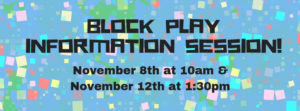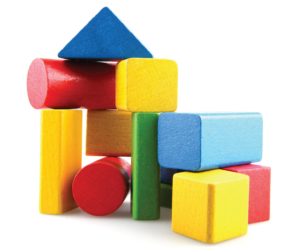Next time you’re in Creating Together, look up – you’ll see a number of signs designating areas as stations for different kinds of learning.

This month, staff are offering information sessions on one of these stations – Building Blocks. The first session held November 8th was a great success, and if you weren’t able to make it, you can attend the next one on the 12th at 1:30pm.
Did you know that building blocks with your child has a number of benefits?
Benefits of Block Play
- Teaches children concept of weight, height, balance, space, shape, size, mass counting, and colours
- Enhances language skills, such as labelling
- Improves motor skills, such as stability and coordination
- Supports their social skill development, by helping them communicate ideas and cooperate with their peers
- Encourages problem solving, creativity, and imagination
- Fun!
Did you know that there is a guide that Creating Together uses in their programming, to ensure they are meeting guidelines and best practices for child development?
Learning Domains and Skill Indicators for Block Play
The 2007 provincial publication of Early Learning for Every Child Today: A framework for Ontario early childhood settings (2014) describes how young children learn and develop, and offers a guide for curriculum in Ontario’s early childhood settings, such as child care centers, regulated home child care, nursery schools, Ontario Early Years Centres, family resource programs, parenting centres, etc.
When we do Block Play, we tap into a number of learning domains and areas of skill development, according to this guide. Below are some examples of learning domains and consequent indicators of skill development, which Parents and caregivers can use, as the staff of Creating Together do, to support each child’s learning and development.
- Problem Solving (4.2): Use blocks to experiment with balance and positions
- Classifying (4.10): Move from random classification by one, or more
- Cooperating (1.6): Exchange ideas and material during play
- Interacting with Adults (1.9): Seeing adults as resources in exploration and problem solving
- Vocabulary (3.3): Using new words
- Language (3.5): Using descriptive language, such as sentences, to explain, explore, and describe objects
 Block Play Tips for Parents and Caregivers
Block Play Tips for Parents and Caregivers
Parents and caregivers can do a number of things to help children get the most of their block play:
- Play at the child’s level
- Use blocks to experiment with balances and positions
- Expand interests with the use of pictures, books, and other aids
- Build the world’s tallest / widest tower
- Try to blow the tower down
- Build small cities, trains, roads, castles, boats, buses
- Have building blocks lead to pretend play (e.g., the houses of the 3 little pigs, the wheels on the bus)
